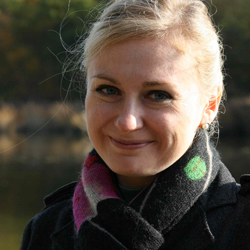Larissa Zakharova passed away
Larissa Zakharova passed away in Moscow last Saturday 2 March at the age of 41 after a long battle with illness. This news is extremely sad for all of us. We have lost an exceptional researcher, an unfailingly friendly and smiling colleague, and a dear friend. A ceremony of remembrance will take place at 18:00, Tuesday 12 March 2019, at the EHESS, 54 Boulevard Raspail, Paris 6e.
Larissa Zakharova was born in Leningrad in 1977 and began her university studies in history and French in that city. After a dissertation at the Collège Universitaire Français, St Petersburg, on the requisitioning of real estate after October 1917, which showed early signs of remarkable curiosity and originality, she joined the EHESS in Paris for doctoral research into Soviet fashion in the 1960s and 1970s. Far from limiting herself to cultural history, she brought to this ground-breaking work an approach that included sociology, culture and economics. After a post-doctoral period in Moscow she was appointed lecturer at the EHESS in 2010 for a project entitled “Tools of communication, modes of government, social relations in the USSR, 1917-1991”. After joining the Centre for Russian, Caucasian and Central European Studies (CERCEC), she became its deputy director in 2015. From 2017 on, she was seconded to the Centre Franco-Russe in Moscow where she was working on an innovative paper on communications in the USSR, also combining social and economic history.
Her varied and extensive research has left us a historiographical legacy of great wealth. In her concern to react against the common-sense clichés concerning the Soviet system, Larissa Zakharova chose to direct her attention to new, original objects so as to provide her own particular view of the history of the USSR. Her work reveals a desire to do justice to the vitality of Soviet society and the relations between its citizens. She regarded the people she studied with benevolence, encouraged the reader to take them at their word and to interpret their statements and signs of commitment. She enjoyed ingeniously combining official sources and less formal documents from personal archives to document this social vitality. Like her own personality, her research was marked by great humanity. Among the major texts she has left us, her book S’habiller à la soviétique. La mode et le dégel en URSS (CNRS Editions, 2011. Dressing the Soviet way. Fashion and the Thaw in the USSR) revised our knowledge of the post-Stalin USSR. She also edited major issues of scholarly journals such as “Le quotidien du communisme: pratiques et objets, Daily life in communism: behaviour and objects”, Annales 2013 and “Communiquer en URSS et en Europe socialiste, Communicating in the USSR and socialist Europe” (with Kristin Roth-Ey), Cahiers du monde russe, 2015.
Larissa Zakharova was also a matchless teacher, and close to all her students.
All our thoughts go to her children, Camille, Émilie and Ivan, and her husband, Grégory Dufaud.
Alain Blum and Françoise Daucé
